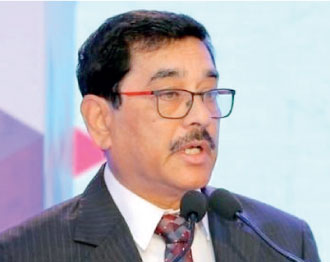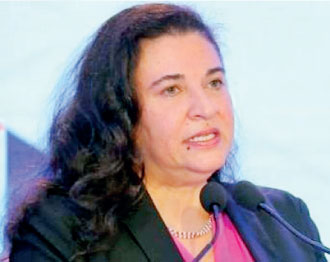Saturday Feb 21, 2026
Saturday Feb 21, 2026
Friday, 26 May 2023 03:10 - - {{hitsCtrl.values.hits}}
 |
| Central Bank Governor Dr. Nandalal Weerasinghe |
 |
| ILO Sri Lanka and the Maldives Director Simrin Singh
|
Central Bank Governor Dr. Nandalal Weerasinghe highlighted yesterday painful processes of the collective policy measures are necessary to avoid the catastrophic impacts to rebuild favourable macroeconomic conditions vital for all stakeholders.
“It is important to understand that short-term painful measures are necessary to restore long-term economic stability,” he said delivering the keynote at the National Policy Symposium for promoting investments and entrepreneurship in Sri Lanka organised by the ILO, in collaboration with the Central Bank, the Office of the Governor of the Northern Province, and the Ceylon Chamber of Commerce.
Pointing out that the unified policy actions are painful for both businesses and households, he said they were critical in the short run to prevent catastrophic impacts on the overall economy.
“The sharp rise in inflation eroded the profitability of the enterprises and hampered new investments due to less profitable investments,” he said.
Claiming that inflation is the main enemy of any economy, Dr. Weerasinghe stressed it was now gradually being tackled to a controllable level.
“The key objective was to take urgent action to control the soaring inflation as well as the balance of payments. The Central Bank acknowledged the necessity to restore price stability and the importance of maintaining low inflation to preserve macroeconomic stability,” he explained.
He recalled that the Central Bank took decisive measures to curtail and prevent inflation from rising beyond 70% or a hyperinflation situation. “Now the inflation is under control and it will be a single digit by the fourth quarter of 2023 with the measures that have been implemented,” he noted.
Dr. Weerasinghe also disclosed that the restrictions on imports are being gradually relaxed, whilst noting that certain limitations on capital transactions will also be relaxed soon.
“We hope these measures will facilitate faster revival for businesses in the near future,” he said, adding that the Central Bank has already removed margin deposit requirements on imports.
He assured that there will be further relaxations with the economic conditions improving both ways in terms of a stable exchange rate and low inflation.
Dr. Weerasinghe also emphasised the importance of nurturing an entrepreneurial mindset, particularly among the youth.
“It recognised that shifting the perception of entrepreneurship from a last resort to a preferred career option is essential for sustainable economic development. Creating a favourable ecosystem for enterprise development should have a sectoral and regional focus, taking into account the unique characteristics and opportunities of different industries and areas,” he elaborated.
The symposium is a joint initiative between two ILO flagship projects: Local Empowerment through Economic Development and Reconciliation (LEED+), and South Asia Leadership in Entrepreneurship (SALE).
ILO Country Office for Sri Lanka and the Maldives Director Simrin Singh emphasised Sri Lanka needs to make progress towards an inclusive and job-rich recovery.
She highlighted the importance of creating an enabling environment for investments at the regional and provincial levels was critical as Sri Lanka is looking into measures to hasten economic growth.
Along with supporting entrepreneurship, she added that it is crucial to consider the opportunities and challenges unique to a given region.
“The symposium comes at a crucial time when Sri Lanka is exploring pathways to accelerate economic growth. This symposium is a platform to share valuable insights gained through extensive engagement with diverse stakeholders, as well as practical and promising on-the-ground solutions, to influence favourable policy outcomes,” said Singh.
With a regional and sectoral focus, the symposium brought to the forefront challenges, insights, and interventions towards creating a favourable ecosystem for enterprise development and investment promotion in Sri Lanka.
One of the significant processes leading up to the symposium was sectoral discussions to identify opportunities and challenges for investments in the Northern Province. This initiative of the ILO LEED+ project provided valuable insights into the specific requirements of the region, helping shape policy discussions and recommendations.
The ILO SALE project, as part of its efforts to foster collaboration and knowledge-sharing among key stakeholders to create an entrepreneurship-friendly ecosystem, conducted joint policy forums with the Central Bank of Sri Lanka and the Ceylon Chamber of Commerce. The symposium saw discussions on the findings of this initiative.
In his introductory remarks, Chief Secretary of the Northern Province S. M. Saman Bandulasena, highlighted that the way forward lies in the hands of the relevant line Ministries, the State Ministry of Rural Economy, the Central Bank of Sri Lanka, the Tertiary and Vocational Education Commission (TVEC), and the Ceylon Chamber of Commerce.
“Together, these entities have a mandate to create a conducive environment for entrepreneurship and investment promotion. By doing so, they aim to generate decent and productive employment opportunities for all,” he added.
It was underscored that both the Government and other ecosystem players, including development sector entities, and the private sector, have a crucial role to play in supporting emerging startups and promoting business resilience. By providing the necessary support and guidance, they can help these startups thrive and contribute to the overall economic recovery of Sri Lanka.
Ceylon Chamber of Commerce Chief Economist Shiran Fernando said the timely national policy symposium came as a much-needed intervention within the context of Sri Lanka’s economic recovery.
“By promoting investments and entrepreneurship, it aims to revitalise the economy and create sustainable growth opportunities. The symposium’s main message revolves around the significance of fostering an entrepreneurial culture, creating an enabling environment for investment promotion, and driving economic development at both the regional and national levels,” he explained.
The credibility of the symposium’s findings and recommendations is backed by the compilation of extensive research and insights obtained from diverse stakeholder consultations. The collaboration with numerous established and recognised partners further enhances the validity and reliability of the proposed solutions.
The LEED+ project is a part of ILO’s Global Jobs for Peace and Resilience Programme and is supported by the Australian Government Department of Foreign Affairs and Trade (DFAT), and the Government of Norway. The SALE programme is supported by the United States Department of State. The ILO is the United Nations specialised agency for the world of work.
It sets international labour standards, provides technical assistance, and engages in policy dialogue to address pressing issues related to employment, labour rights, and social protection. The ILO works closely with governments, employers’ and workers’ organisations, and other stakeholders to achieve its mission of advancing social justice and promoting decent work worldwide.